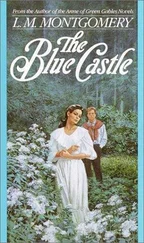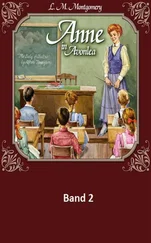"Miss Holmes, I presume," he said at last, in a deep, thrilling voice. "I—I—oh, confound it! I have called—I heard some foolish stories and I came here in a rage. I've been a fool—I know now they weren't true. Just excuse me and I'll go away and kick myself."
"No," I said, finding my voice with a gasp, "you mustn't go until you've heard the truth. It's dreadful enough, but not as dreadful as you might otherwise think. Those—those stories—I have a confession to make. I did tell them, but I didn't know there was such a person as Cecil Fenwick in existence."
He looked puzzled, as well he might. Then he smiled, took my hand and led me away from the door—to the knob of which I was still holding with all my might—to the sofa.
"Let's sit down and talk it over 'comfy,'" he said.
I just confessed the whole shameful business. It was terribly humiliating, but it served me right. I told him how people were always twitting me for never having had a beau, and how I had told them I had; and then I showed him the porous plaster advertisement.
He heard me right through without a word, and then he threw back his big, curly, gray head and laughed.
"This clears up a great many mysterious hints I've been receiving ever since I came to Avonlea," he said, "and finally a Mrs. Gilbert came to my sister this afternoon with a long farrago of nonsense about the love affair I had once had with some Charlotte Holmes here. She declared you had told her about it yourself. I confess I flamed up. I'm a peppery chap, and I thought—I thought—oh, confound it, it might as well out: I thought you were some lank old maid who was amusing herself telling ridiculous stories about me. When you came into the room I knew that, whoever was to blame, you were not."
"But I was," I said ruefully. "It wasn't right of me to tell such a story—and it was very silly, too. But who would ever have supposed that there could be a real Cecil Fenwick who had lived in Blakely? I never heard of such a coincidence."
"It's more than a coincidence," said Mr. Fenwick decidedly. "It's predestination; that is what it is. And now let's forget it and talk of something else."
We talked of something else—or at least Mr. Fenwick did, for I was too ashamed to say much—so long that Nancy got restive and clumped through the hall every five minutes; but Mr. Fenwick never took the hint. When he finally went away he asked if he might come again.
"It's time we made up that old quarrel, you know," he said, laughing.
And I, an old maid of forty, caught myself blushing like a girl. But I felt like a girl, for it was such a relief to have that explanation all over. I couldn't even feel angry with Adella Gilbert. She was always a mischief maker, and when a woman is born that way she is more to be pitied than blamed. I wrote a poem in the blank book before I went to sleep; I hadn't written anything for a month, and it was lovely to be at it once more.
Mr. Fenwick did come again—the very next evening, but one. And he came so often after that that even Nancy got resigned to him.
One day I had to tell her something. I shrank from doing it, for I feared it would make her feel badly.
"Oh, I've been expecting to hear it," she said grimly. "I felt the minute that man came into the house he brought trouble with him. Well, Miss Charlotte, I wish you happiness. I don't know how the climate of California will agree with me, but I suppose I'll have to put up with it."
"But, Nancy," I said, "I can't expect you to go away out there with me. It's too much to ask of you."
"And where else would I be going?" demanded Nancy in genuine astonishment. "How under the canopy could you keep house without me? I'm not going to trust you to the mercies of a yellow Chinee with a pig-tail. Where you go I go, Miss Charlotte, and there's an end of it."
I was very glad, for I hated to think of parting with Nancy even to go with Cecil. As for the blank book, I haven't told my husband about it yet, but I mean to some day. And I've subscribed for the Weekly Advocate again.
III. HER FATHER'S DAUGHTER
"We must invite your Aunt Jane, of course," said Mrs. Spencer.
Rachel made a protesting movement with her large, white, shapely hands—hands which were so different from the thin, dark, twisted ones folded on the table opposite her. The difference was not caused by hard work or the lack of it; Rachel had worked hard all her life. It was a difference inherent in temperament. The Spencers, no matter what they did, or how hard they labored, all had plump, smooth, white hands, with firm, supple fingers; the Chiswicks, even those who toiled not, neither did they spin, had hard, knotted, twisted ones. Moreover, the contrast went deeper than externals, and twined itself with the innermost fibers of life, and thought, and action.
"I don't see why we must invite Aunt Jane," said Rachel, with as much impatience as her soft, throaty voice could express. "Aunt Jane doesn't like me, and I don't like Aunt Jane."
"I'm sure I don't see why you don't like her," said Mrs. Spencer.
"It's ungrateful of you. She has always been very kind to you."
"She has always been very kind with one hand," smiled Rachel. "I remember the first time I ever saw Aunt Jane. I was six years old. She held out to me a small velvet pincushion with beads on it. And then, because I did not, in my shyness, thank her quite as promptly as I should have done, she rapped my head with her bethimbled finger to 'teach me better manners.' It hurt horribly—I've always had a tender head. And that has been Aunt Jane's way ever since. When I grew too big for the thimble treatment she used her tongue instead—and that hurt worse. And you know, mother, how she used to talk about my engagement. She is able to spoil the whole atmosphere if she happens to come in a bad humor. I don't want her."
"She must be invited. People would talk so if she wasn't."
"I don't see why they should. She's only my great-aunt by marriage. I wouldn't mind in the least if people did talk. They'll talk anyway—you know that, mother."
"Oh, we must have her," said Mrs. Spencer, with the indifferent finality that marked all her words and decisions—a finality against which it was seldom of any avail to struggle. People, who knew, rarely attempted it; strangers occasionally did, misled by the deceit of appearances.
Isabella Spencer was a wisp of a woman, with a pale, pretty face, uncertainly-colored, long-lashed grayish eyes, and great masses of dull, soft, silky brown hair. She had delicate aquiline features and a small, babyish red mouth. She looked as if a breath would sway her. The truth was that a tornado would hardly have caused her to swerve an inch from her chosen path.
For a moment Rachel looked rebellious; then she yielded, as she generally did in all differences of opinion with her mother. It was not worth while to quarrel over the comparatively unimportant matter of Aunt Jane's invitation. A quarrel might be inevitable later on; Rachel wanted to save all her resources for that. She gave her shoulders a shrug, and wrote Aunt Jane's name down on the wedding list in her large, somewhat untidy handwriting—a handwriting which always seemed to irritate her mother. Rachel never could understand this irritation. She could never guess that it was because her writing looked so much like that in a certain packet of faded letters which Mrs. Spencer kept at the bottom of an old horsehair trunk in her bedroom. They were postmarked from seaports all over the world. Mrs. Spencer never read them or looked at them; but she remembered every dash and curve of the handwriting.
Isabella Spencer had overcome many things in her life by the sheer force and persistency of her will. But she could not get the better of heredity. Rachel was her father's daughter at all points, and Isabella Spencer escaped hating her for it only by loving her the more fiercely because of it. Even so, there were many times when she had to avert her eyes from Rachel's face because of the pang of the more subtle remembrances; and never, since her child was born, could Isabella Spencer bear to gaze on that child's face in sleep.
Читать дальше



